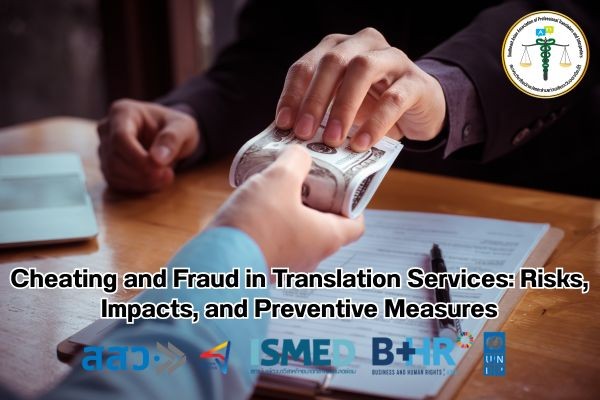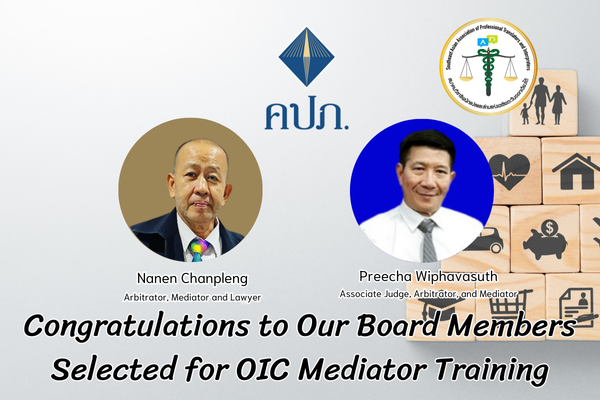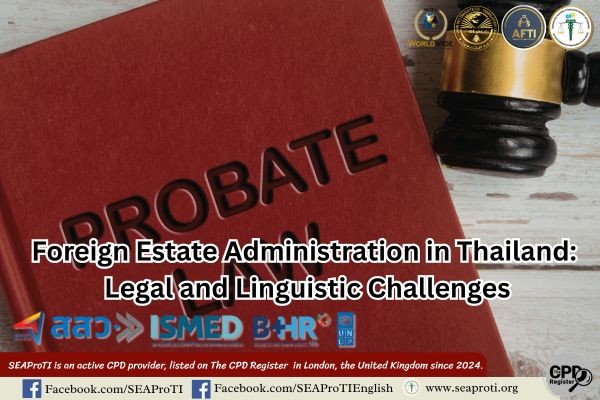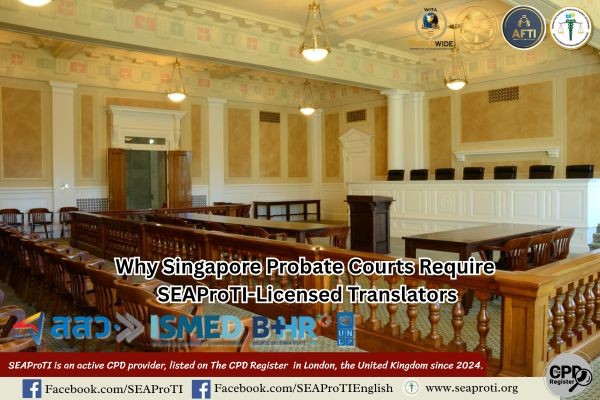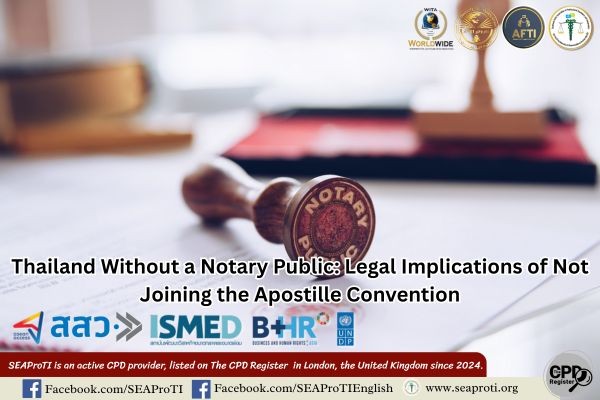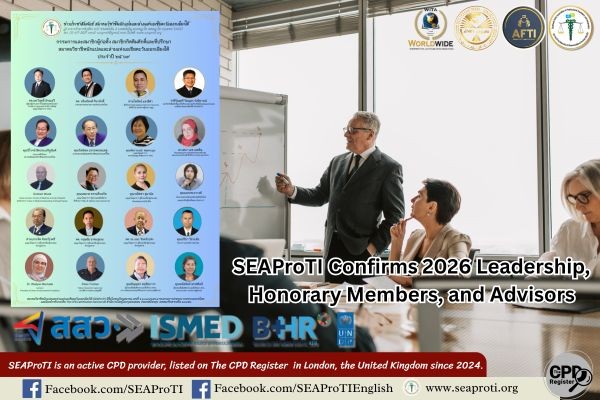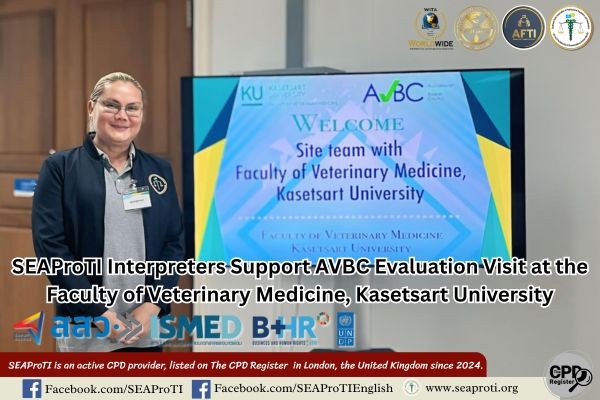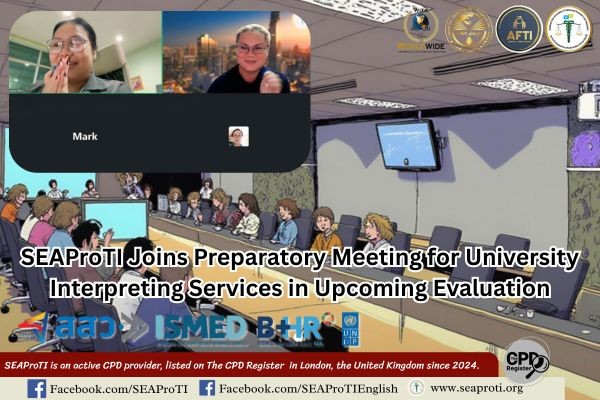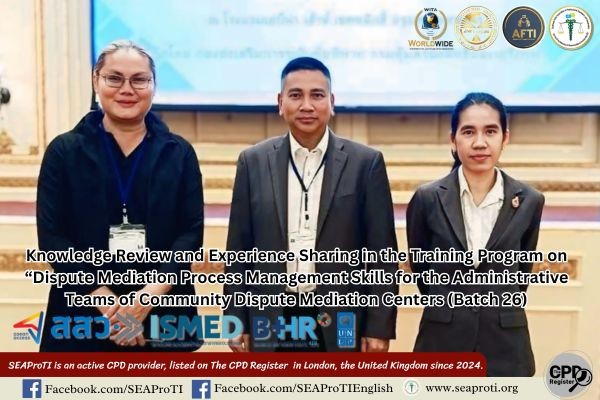Cheating and Fraud in Translation Services: Risks, Impacts, and Preventive Measures
20 June 2025, Bangkok – Translation services play a crucial role in the legal system, healthcare, and international relations. However, fraud and unethical practices in the industry remain a systemic problem that causes serious legal and social consequences. This article analyzes common forms of fraud in translation services, examines the impacts on clients and justice systems, and proposes preventive strategies based on case studies in Thailand and global best practices outlined by professional bodies such as SEAProTI.
Crisis of Confidence in Translation and Interpreting: When the Unqualified Penetrate the System
Translation and interpreting services are increasingly vital in a globalized world, especially in law, medicine, and public service. However, rising demand and a lack of regulatory oversight have led to widespread abuse by unqualified individuals, causing significant damage in legal, economic, and ethical terms.
Common Forms of Cheating
- Use of Unqualified or Uncertified Translators
Many individuals falsely claim to hold qualifications or forged certificates in order to secure translation jobs—particularly in legal and medical sectors—leading to critical errors that can violate clients’ rights.
- CV Fraud and Identity Misuse
Fraudsters often steal or manipulate the resumes of legitimate professionals to win jobs, then outsource the work to unskilled individuals or use machine translation tools like Google Translate without supervision or review.
- Overcharging and Billing Scams
This is especially prevalent in public institutions such as hospitals and schools, where service providers inflate charges for unnecessary hours or proofreading services that were never performed.
- Phishing and Impersonation
Scammers impersonate real translation agencies via fake emails and documents, deceiving clients into transferring payments or sharing sensitive information. Several hospitals, for example, have unknowingly paid fraudulent invoices.
- Fake Certifications and “Pay-to-Play” Schemes
Some organizations issue fake translator/interpreter certificates without any credible evaluation process. These undermine professional standards and mislead both clients and legitimate practitioners.
- Unethical Legal Practices
In Thailand, some legal professionals bypass certified interpreters by providing their own translations or using uncertified individuals (e.g., assistants or clerks) to manipulate meaning in court. This undermines due process and fairness in judicial proceedings.
Impacts
- Legal and Financial Consequences: Errors in legal documents or medical records can lead to lawsuits, delayed court proceedings, or misdiagnoses that harm patients.
- Loss of Trust and Credibility: Organizations that rely on poor-quality translation services may lose partners, clients, and public confidence.
- Confidentiality Breaches: There have been instances where translators leaked sensitive information to competitors or the media, leading to litigation and loss of competitive advantage.
- Erosion of Justice: Inaccurate or biased translations in court can violate defendants’ rights and weaken public trust in the justice system.
Preventive Measures
- Hire Certified Professionals
Always work with translators certified by recognized professional bodies such as SEAProTI, which upholds standards through rigorous testing and a code of ethics.
- Thorough Credential Verification
Check qualifications, experience, and references. When in doubt, contact the certifying body directly.
- Clear Written Agreements
Contracts should include confidentiality clauses, quality standards, and penalties for substandard work or ethical violations.
- Implement Quality Control
Use professional proofreaders or quality assurance panels to review translations before delivery.
- Use Trusted Platforms and Agencies
Select agencies or platforms that rigorously screen and test their translators and interpreters.
Client Education
Public and private sector clients should be trained on the importance of certified translation services to avoid falling victim to scams.
Conclusion
Fraud in translation services takes many forms—from fake certifications to unethical behavior in courtrooms. The consequences not only compromise communication quality but also damage the credibility of legal and public service systems. Employers and institutions must act with due diligence, engage certified professionals, and enforce robust quality controls. Meanwhile, professional bodies like SEAProTI play a critical role in raising standards and protecting clients from fraudulent practices within the translation industry.
SEAProTI’s certified translators, translation certification providers, and certified interpreters:
The Southeast Asian Association of Professional Translators and Interpreters (SEAProTI) has officially announced the criteria and qualifications for individuals to register as “Certified Translators,” “Translation Certification Providers,” and “Certified Interpreters” under the association’s regulations. These guidelines are detailed in Sections 9 and 10 of the Royal Thai Government Gazette, issued by the Secretariat of the Cabinet under the Office of the Prime Minister of the Kingdom of Thailand, dated July 25, 2024, Volume 141, Part 66 Ng, Page 100.
To read the full publication, visit the Royal Thai Government Gazette
การทุจริตและการฉ้อโกงในบริการแปล: ความเสี่ยง ผลกระทบ และแนวทางป้องกัน
20 มิถุนายน 2568, กรุงเทพมหานคร – บริการแปลมีบทบาทสำคัญในระบบกฎหมาย การสาธารณสุข และความสัมพันธ์ระหว่างประเทศ อย่างไรก็ตาม การทุจริตและการฉ้อโกงในอุตสาหกรรมนี้ยังคงเป็นปัญหาเชิงโครงสร้างที่ส่งผลกระทบอย่างรุนแรงทั้งในเชิงกฎหมายและสังคม บทความนี้วิเคราะห์รูปแบบการทุจริตที่พบบ่อย ผลกระทบต่อผู้รับบริการและระบบยุติธรรม และนำเสนอแนวทางป้องกันเชิงระบบ โดยอิงจากกรณีศึกษาในประเทศไทยและแนวปฏิบัติสากลที่กำหนดโดยองค์กรวิชาชีพ เช่น SEAProTI
วิกฤตความเชื่อมั่นในบริการแปลและล่าม: เมื่อผู้ไม่มีคุณสมบัติแฝงตัวในระบบ
บริการแปลและล่ามมีความสำคัญในโลกยุคโลกาภิวัตน์ โดยเฉพาะในภาคกฎหมาย การแพทย์ และบริการสาธารณะ อย่างไรก็ดี ความต้องการที่สูงและการขาดระบบควบคุมที่เข้มงวดนำไปสู่ปัญหาการหลอกลวงและการใช้บริการโดยผู้ไม่มีคุณสมบัติ ทำให้เกิดความเสียหายทั้งทางกฎหมาย เศรษฐกิจ และจริยธรรม
รูปแบบการทุจริตที่พบบ่อย (Common Forms of Cheating)
- การใช้ผู้แปลที่ไม่มีใบรับรองหรือไม่มีคุณสมบัติ
ผู้แปลจำนวนมากแอบอ้างวุฒิหรือใบรับรองปลอมเพื่อรับงาน โดยเฉพาะในงานแปลทางกฎหมายและการแพทย์ ส่งผลให้เกิดการแปลผิดพลาดซึ่งอาจกระทบสิทธิของผู้รับบริการอย่างรุนแรง
- การแอบอ้างประวัติส่วนตัวหรือผลงาน (CV Fraud)
ผู้ไม่ประสงค์ดีบางรายขโมยหรือดัดแปลงประวัติของนักแปลมืออาชีพเพื่อลวงให้ได้รับงาน ก่อนส่งงานต่อให้บุคคลที่ไม่มีความสามารถ หรือใช้เครื่องแปลอัตโนมัติอย่าง Google Translate โดยไม่มีการตรวจสอบ
- การคิดค่าบริการเกินจริง (Overcharging)
พบได้ในหน่วยงานรัฐ เช่น โรงพยาบาลหรือโรงเรียน ที่ตกเป็นเหยื่อของการเรียกเก็บค่าบริการที่ไม่จำเป็น เช่น ชั่วโมงล่ามเกินจริง ค่าตรวจแก้ที่ไม่ได้ดำเนินการจริง
- การหลอกลวงผ่านอีเมลและการปลอมแปลงเอกสาร (Phishing & Impersonation)
ผู้ไม่หวังดีส่งอีเมลปลอมในนามของบริษัทแปลที่มีอยู่จริง เพื่อขโมยเงินหรือข้อมูล เช่น กรณีโรงพยาบาลตอบรับใบแจ้งหนี้ปลอมและโอนเงินโดยไม่ทราบว่าถูกหลอก
- การออกใบรับรองปลอม (Pay-to-Play Certification)
บางองค์กรไม่มีมาตรฐานหรือการประเมินจริง แต่แอบอ้างออกใบรับรองให้นักแปลโดยไม่ตรวจสอบคุณสมบัติ ทำให้เกิดการบิดเบือนมาตรฐานวิชาชีพ
- พฤติกรรมผิดจริยธรรมในกระบวนการยุติธรรม
ในประเทศไทย พบว่านักกฎหมายบางรายหลีกเลี่ยงการใช้ล่ามที่ได้รับการรับรอง โดยแปลเองหรือใช้บุคคลที่ไม่มีคุณสมบัติ เช่น ผู้ช่วยทนาย เพื่อควบคุมผลการสื่อความในชั้นศาล ซึ่งเป็นการบิดเบือนกระบวนการยุติธรรม
ผลกระทบ (Impacts)
- ผลทางกฎหมายและการเงิน: การแปลผิดในเอกสารทางกฎหมายหรือเวชระเบียนอาจนำไปสู่คดีฟ้องร้อง ความล่าช้าทางศาล หรือความเสียหายด้านสุขภาพผู้ป่วย
- ผลกระทบต่อความน่าเชื่อถือ: องค์กรที่ใช้บริการแปลที่ไม่มีคุณภาพอาจสูญเสียลูกค้า หุ้นส่วน หรือชื่อเสียงในระยะยาว
- การละเมิดความลับ: มีกรณีที่ผู้แปลเปิดเผยข้อมูลให้คู่แข่งหรือสื่อมวลชน ส่งผลให้เกิดคดีความหรือสูญเสียทางธุรกิจ
- บ่อนทำลายกระบวนการยุติธรรม: การแปลผิดพลาดหรือมีอคติในศาลส่งผลโดยตรงต่อสิทธิของผู้ต้องหาและความยุติธรรมโดยรวมของสังคม
แนวทางป้องกัน (Prevention Measures)
- จ้างผู้เชี่ยวชาญที่ผ่านการรับรอง
ควรเลือกนักแปลที่ได้รับการรับรองจากองค์กรวิชาชีพ เช่น SEAProTI ซึ่งมีระบบทดสอบและจรรยาบรรณควบคุม
- ตรวจสอบประวัติอย่างละเอียด
ก่อนว่าจ้างควรตรวจสอบประวัติ วุฒิ และผลงานอย่างเข้มงวด อาจติดต่อองค์กรผู้ออกใบรับรองเพื่อยืนยัน
- กำหนดข้อตกลงเป็นลายลักษณ์อักษร
ควรระบุขอบเขตงาน ข้อกำหนดความลับ และบทลงโทษหากคุณภาพไม่ผ่านในสัญญา
- มีระบบตรวจสอบคุณภาพ
ควรมีผู้พิสูจน์อักษรหรือกรรมการตรวจคุณภาพงานแปลก่อนส่งมอบ
- ใช้แพลตฟอร์มที่น่าเชื่อถือ
ควรใช้บริษัทหรือแพลตฟอร์มที่มีระบบคัดกรองนักแปล เช่น ผ่านการทดสอบ หรือมีประวัติผลงานที่ตรวจสอบได้
- ให้ความรู้แก่ผู้ใช้งาน
หน่วยงานรัฐและองค์กรควรจัดอบรมเกี่ยวกับความสำคัญของการใช้ผู้แปลที่มีใบรับรอง เพื่อหลีกเลี่ยงการถูกหลอก
บทสรุป (Conclusion)
การทุจริตในบริการแปลมีหลากหลายรูปแบบ ตั้งแต่การปลอมใบรับรองจนถึงพฤติกรรมที่บิดเบือนในกระบวนการยุติธรรม ผลกระทบของการกระทำเหล่านี้ไม่เพียงแต่ทำลายคุณภาพการสื่อสาร หากแต่บ่อนทำลายความเชื่อมั่นในระบบกฎหมายและการบริการสาธารณะด้วย องค์กรผู้ว่าจ้างควรดำเนินการอย่างรอบคอบ ใช้ผู้เชี่ยวชาญที่ผ่านการรับรอง และสนับสนุนระบบการตรวจสอบคุณภาพอย่างเข้มงวด ขณะเดียวกัน องค์กรวิชาชีพอย่าง SEAProTI มีบทบาทสำคัญในการยกระดับมาตรฐานวิชาชีพและปกป้องผู้บริโภคจากการฉ้อโกงในวงการแปล
เกี่ยวกับนักแปลรับรอง ผู้รับรองการแปล และล่ามรับรองของสมาคมวิชาชีพนักแปลและล่ามแห่งเอเชียตะวันออกเฉียงใต้
สมาคมวิชาชีพนักแปลและล่ามแห่งเอเชียตะวันออกเฉียงใต้ (SEAProTI) ได้ประกาศหลักเกณฑ์และคุณสมบัติผู้ที่ขึ้นทะเบียนเป็น “นักแปลรับรอง (Certified Translators) และผู้รับรองการแปล (Translation Certification Providers) และล่ามรับรอง (Certified Interpreters)” ของสมาคม หมวดที่ 9 และหมวดที่ 10 ในราชกิจจานุเบกษา ของสำนักเลขาธิการคณะรัฐมนตรี ในสำนักนายกรัฐมนตรี แห่งราชอาณาจักรไทย ลงวันที่ 25 ก.ค. 2567 เล่มที่ 141 ตอนที่ 66 ง หน้า 100 อ่านฉบับเต็มได้ที่: นักแปลรับรอง ผู้รับรองการแปล และล่ามรับรอง


